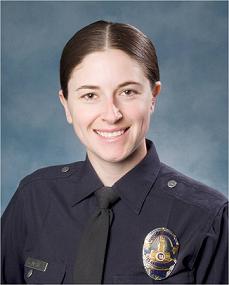LAPD officer killed in crash was a standout Colleagues and department officials describe Officer Spree Desha, 35, a seven-year veteran, as a solid, serious cop. Desha recently started a new job at headquarters downtown.
By Andrew Blankstein and Joel Rubin
Los Angeles Times Staff Writers
Sep 15, 2008
Amid the ranks of the city's young, ambitious police officers, Spree Desha stood out.
It was not just that she was tall and striking, although she was both of those. She was a solid, serious cop, who had begun a steady climb through the ranks of the Los Angeles Police Department.
Desha, 35, was killed Friday, one of at least 25 fatalities in the head-on collision of a Metrolink commuter train and a freight train in Chatsworth.
For the hundreds of police officers and firefighters who worked through the night, the tragedy turned personal as word spread that an officer was among the dead. Some at the scene were said to be former patrol partners of Desha's.
Scores of officers stood in two, solemn columns along the edge of the wreckage, a makeshift honor guard waiting to salute their fallen colleague. As her body was removed on a board, covered with an American flag, her colleagues gently carried her to an ambulance with military precision and respect. Desha's badge, said one officer who helped carry her body, was bent almost in half by the force of the crash.
A Los Angeles County sheriff's deputy who was on the train and badly injured remained in critical but stable condition. He is expected to survive, authorities said.
On Saturday, officers who had worked with Desha recalled her as someone who thrived in her role training recruits and had recently taken on a new, high-pressure job in the department's nerve center.
"She was uncommonly thoughtful, very intelligent," said Assistant Chief Earl Paysinger, who runs the department's Office of Operations. He first saw Desha in action this week on her new job, briefing LAPD officials on the roll-out of a computerized tracking system that aims to streamline the complex deployment of the department's nearly 10,000 officers.
After years as a patrol officer in North Hollywood and elsewhere, Desha was reassigned in August to headquarters downtown. Stepping in to one of the department's most intense offices, she made a quick impression with her "sharp wit" and easy communication skills, Paysinger and others said. Adjusting to her new commute from her home in Simi Valley to Union Station downtown, Desha made it a point to wear her uniform on the train and always rode in the front car in case there were any problems, said Assistant Chief Jim McDonnell.
But, in her heart, Desha loved being a street cop. A seven-year veteran of the department, she maneuvered to remain in patrol and narcotics assignments -- holding off on the administrative jobs downtown that any ambitious officer typically does to get promoted through the ranks. More than anything, she thrived in her role as a field training officer, responsible for breaking in nervous or over-eager cops fresh out of the academy.
Her charges, a supervisor said, described her as "strict, fair and approachable."
Supervisors in North Hollywood remembered Desha as a serious, hard-charging officer who wasn't one to joke around while in uniform and went about her job with little fanfare and a quiet determination.
"As much as I tried to get her to not to call me 'sir,' she just wouldn't do it," said Lt. John Romero, of the LAPD's media relations section.
Desha earned 34 formal commendations in her personnel record. In performance evaluations, one supervisor noted that Desha approached a "new assignment with enthusiasm and anticipation." Another wrote that she was "a dedicated and energetic officer who goes out and enjoys getting the job done."
Romero and Lt. Maria Acosta, another supervisor, recalled how Desha spearheaded a cancer charity fundraiser in the station. In exchange for pledges, officers shaved their heads -- a symbol of solidarity with cancer patients who lose their hair during treatment. Desha was one of the few women to part with their locks.
Before she took a razor to her head, Romero asked her if she really wanted to take the leap.
"She had such beautiful hair. But she didn't hesitate," he remembered. "She said, 'I'll do what the patients do, I'll deal with it."












